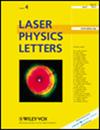Semiquantum private comparison based on Bell states without quantum measurements from the classical user
IF 1.4
4区 物理与天体物理
Q3 OPTICS
引用次数: 0
Abstract
In this paper, we propose a novel semiquantum private comparison (SQPC) protocol based on Bell states, which enables one quantum user and one classical user to compare the equality of their private inputs with the help of a semi-honest quantum third party (TP). TP is assumed to be semi-honest in the sense that she may take all possible attacks to steal users’ private inputs except conspiring with anyone. The security analysis validates that our protocol can resist not only the attacks from internal participants but also the attacks from an external eavesdropper. Besides, our protocol only asks TP to perform Bell basis measurements but does not need quantum entanglement swapping; and it releases the classical user from conducting quantum measurements and having a quantum memory. Moreover, our protocol can take advantage over previous SQPC protocols based on Bell states in qubit efficiency. Finally, our protocol can be generalized into its counterpart of the collective-dephasing noise quantum channel.基于贝尔态的半量子私密比较,无需经典用户进行量子测量
在本文中,我们提出了一种基于贝尔态的新型半量子私人比较(SQPC)协议,它能让一个量子用户和一个经典用户在半诚实量子第三方(TP)的帮助下比较其私人输入的相等性。假设 TP 是半诚实的,即她可以采取所有可能的攻击来窃取用户的私人输入,但与任何人共谋的情况除外。安全分析验证了我们的协议不仅能抵御来自内部参与者的攻击,还能抵御来自外部窃听者的攻击。此外,我们的协议只要求 TP 进行贝尔基测量,而不需要量子纠缠交换;而且它使经典用户无需进行量子测量和拥有量子存储器。此外,与之前基于贝尔态的 SQPC 协议相比,我们的协议在量子比特效率方面更具优势。最后,我们的协议还可以推广到其对应的集体相消噪声量子信道中。
本文章由计算机程序翻译,如有差异,请以英文原文为准。
求助全文
约1分钟内获得全文
求助全文
来源期刊

Laser Physics Letters
物理-仪器仪表
CiteScore
3.30
自引率
11.80%
发文量
174
审稿时长
2.4 months
期刊介绍:
Laser Physics Letters encompasses all aspects of laser physics sciences including, inter alia, spectroscopy, quantum electronics, quantum optics, quantum electrodynamics, nonlinear optics, atom optics, quantum computation, quantum information processing and storage, fiber optics and their applications in chemistry, biology, engineering and medicine.
The full list of subject areas covered is as follows:
-physics of lasers-
fibre optics and fibre lasers-
quantum optics and quantum information science-
ultrafast optics and strong-field physics-
nonlinear optics-
physics of cold trapped atoms-
laser methods in chemistry, biology, medicine and ecology-
laser spectroscopy-
novel laser materials and lasers-
optics of nanomaterials-
interaction of laser radiation with matter-
laser interaction with solids-
photonics
 求助内容:
求助内容: 应助结果提醒方式:
应助结果提醒方式:


